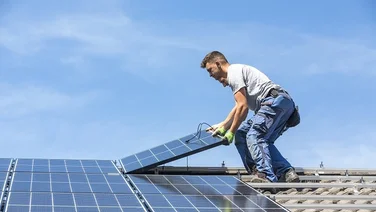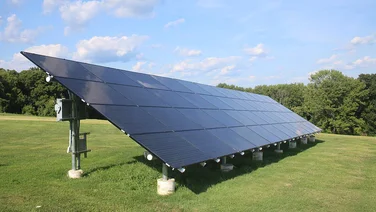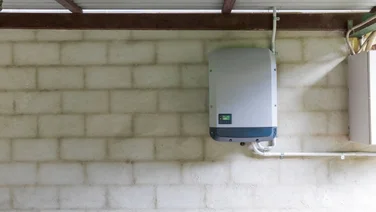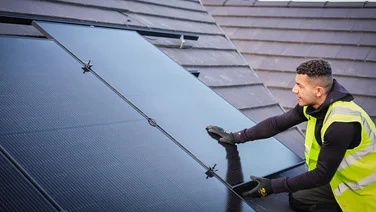We receive a small fee from trusted installers when you request a quote through our site. This helps us keep our content independent, well-researched and up to date – Learn more
- What is a solar diverter?
- How does a solar diverter work?
- What is a solar diverter used for?
- How much does a solar diverter cost?
- When do you break even on a solar diverter?
- How is a solar diverter installed?
- Pros and cons of solar diverters
- Are solar diverters worth it?
- Do solar diverters require any maintenance?
- Next steps
- FAQs
- Solar diverters redirect surplus energy to power appliances in the home
- They cost around £300-£500 on average, plus installation
- Those on the feed-in tariff are likely to benefit from a diverter
A solar diverter can be a handy way to increase your solar panel’s output and make the most out of it. After all, the more electricity your system generates, the sooner you’ll be able to break even on the cost of buying the solar panels themselves.
We’ve rounded up everything you need to know about this technology and if it’s worth the investment.
If you’re in the first stages of considering solar energy for your home and want to find out how much it’ll cost you to get solar panels installed, we can speed up the process.
Alternatively, compare solar panel prices by entering a few details in this short form, and our expert installers will get back to you with bespoke quotes.
Where do you want to install solar panels?
Get started
What is a solar diverter?
A solar diverter is a device used in conjunction with solar panels to optimise energy usage within a household.
Its purpose is to direct excess electricity generated by the solar panels towards a specific load or appliance, usually to heat water, instead of exporting it back to the grid. This maximises the overall efficiency of the solar panels for the homeowner.
How does a solar diverter work?
When the solar panels generate more electricity than is currently being consumed within the home, the solar diverter detects this surplus and automatically diverts the excess energy to a designated appliance.
What is a solar diverter used for?
Rebecca Armstrong, Managing Director of Making Energy Greener, explains: “Instead of exporting excess electricity back to the grid, a solar diverter redirects this surplus energy to power appliances or devices in your home, such as solar water heaters, electric heating systems, or even electric vehicle charging stations. This increases the self-consumption of solar energy, reducing reliance on grid power and thus, lowering electricity bills.”
Using a diverter to heat water is the most common use, although it can be used for other devices as Rebecca explained. It’s worth noting that solar diverters can’t be used to heat hot water if a combi boiler is installed in your home.
Where do you want to install solar panels?
Get startedHow much does a solar diverter cost?
According to HomeHeatingGuide, the Solar iBoost from Marlec is the most popular choice of power diverter in the UK and can cost between £250-£300. Other popular diverters include Eddi from Myenergi, closer to £400 in price, and the SolarEdge diverter which ranges from around £100-£400.
Ultimately, the cost of a solar diverter depends on several factors, including the brand, model, features, and installation requirements. We would always advise consulting with a local solar installation company or supplier to get an accurate cost for a diverter that will work for your needs.
Installation costs will also need to be factored into your budget – these can vary based on the complexity of the installation, the existing electrical setup, and any additional components or accessories required.
As solar panel uptake increases, a growing number of manufacturers are bringing their own products to market. Therefore, we expect the cost of diverters to gradually fall as prices become more competitive.
When do you break even on a solar diverter?
David Lukeman, Managing Director of HeatElectric, says, “Solar diverters can often pay for themselves in just two years. Although the best way to use your solar energy really varies from case to case. For most customers, you will save more money and get payback for your diverter quicker by using the excess electricity you generate in your own home.
“However, if you benefit from a higher solar buy-back tariff where your electricity costs around the same amount you can sell it back for, selling excess back to the grid can be more worthwhile.”
How is a solar diverter installed?
Using hot water supply as an example, the solar diverter (which is a small electronic box) is fitted to sit between your boiler’s electrical supply switch and immersion heater switch (which is a back-up in case of a gas failure).
When the immersion heater switch is on, it’ll power the solar diverter but the immersion heater itself will receive no power. The solar diverter is able to monitor the solar panels and can detect excess energy. When excess is produced, it is then diverted into the immersion heater to heat the water.
With diverters such as the Eddi, it can work in harmony via internet connection with other products (such as Zappi, the electric vehicle charger also made by MyEnergi), maximising all your own self-generated solar.
Any solar diverter installation should be performed by a qualified electrician or a professional solar installer to ensure compliance with safety regulations.
Pros and cons of solar diverters
Solar diverters will benefit different households for various reasons, so before you invest in one, make sure to weigh out the pros and cons.
To give you a head start, we’ve listed some of the main advantages and disadvantages below.
- Maximises the use of solar energy generated by your panels, reducing energy bills
- Uses green energy and reduces carbon footprint
- Doesn’t affect feed in tariff – the tariff will pay for 50% of the energy your system generates, therefore you will still be paid the same if you export to the grid or divert to your appliances
- You’ll need to pay for professional installation as well as the diverter itself
- It can’t be used to heat water if the property uses a combi boiler
- May not financially be beneficial for those on the Smart Export Guarantee, depending on the rate you’re getting for your excess energy
- A diverter has a shorter lifespan (approx. 10 years) compared to solar panels so will likely need replacing

Are solar diverters worth it?
If you’re on the government’s original feed-in tariff, then yes, a solar diverter will be worth it.
Dave Watton, owner of Dave Watton Electrical, explains, “Solar diverters don’t affect solar panel systems with the feed-in tariff, the tariff will pay for 50% of the energy your system generates, therefore you will still be paid the same if you export to the grid or divert to heat hot water.”
This means it’s certainly worth considering as it’s a great way to further lower your energy bills and ensure you’re getting the most from your solar panels.
The Smart Export Guarantee, which was introduced by government in 2020 following the closure of the feed-in tariff in 2019, lets energy suppliers decide what tariffs to offer their customers.
With current UK export rates being high (Octopus Energy offering 15p per kilowatt hour (kWh), Scottish Power offering 12p per kWh) you’re actually likely to benefit more from the money you’d get exporting your excess energy to the grid than using a diverter.
As we’ve explained previously, your solar power is actually worth more than this, but it’s better to make money from it than not at all.
However, as summarised by Gary Does Solar, if your energy supplier’s export rate is less than 12p per kWh and you have a high usage of hot water (for example a household of 4) then a diverter is still worth looking into.
Ultimately, it depends on your personal situation, whether you’re on the feed-in tariff or SEG, plus the electricity consumption patterns in your household.
Do solar diverters require any maintenance?
Solar diverters generally require minimal maintenance. However, it’s worth checking periodically to ensure it is clean, free from debris, and not damaged.
Some solar diverters may have firmware that can be updated by the manufacturer. Check if there are any firmware updates available and follow the instructions provided to keep the unit up to date.
If you experience any issues or notice a decline in the diverter’s performance, it may be necessary to consult the original installer or the manufacturer’s support team for assistance.
Next steps
Understanding how you can get the most out of your solar panel investment is vital, especially when bills are high due to a cost-of-living crisis.
There are several factors that come into play when deciding if a solar diverter is right for you – particularly if you’re on the Smart Energy Guarantee – so we advise speaking to a professional if you’re unsure.
But before you look into solar panel diverters, you’ll need to suss out the solar panel system itself. Want to compare prices? Simply enter a few details in our quick and easy form, and our expert installers will get back to you with several quotes relevant to your needs.
FAQs
Are solar diverters worth it?
They are certainly worth considering as a way to lower your energy bills further and ensure you’re getting the most from your solar panels. However, research should be undertaken to see if you’re likely to benefit more from the money you’d get exporting your excess energy to the grid.
What is a solar diverter used for?
A solar diverter is a device used in conjunction with solar panels to optimise energy usage within a household. The purpose of a solar diverter is to direct excess electricity generated by the solar panels towards a specific load or appliance.
Do you need building regs for solar thermal?
Although planning permission isn’t usually required for the installation of solar panels, the installation of them is still subject to standard building regulations. Your roof needs checking to ensure it is capable of supporting the additional weight of the solar panels.









